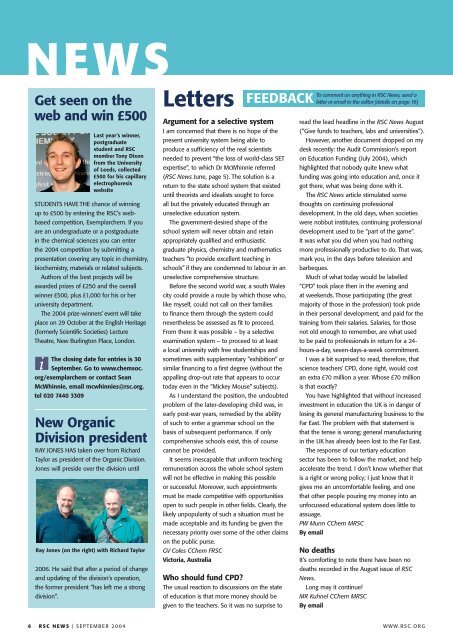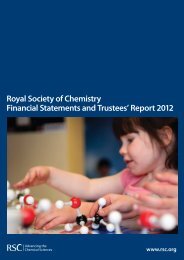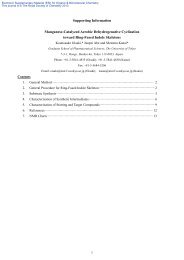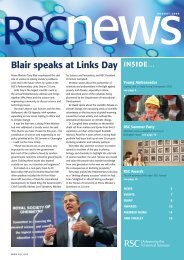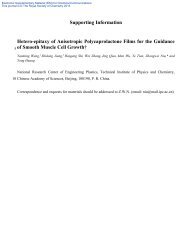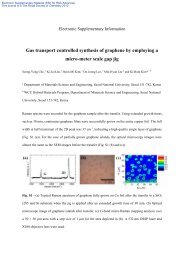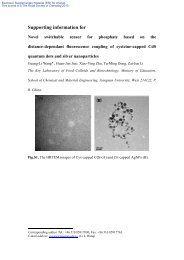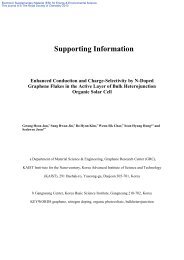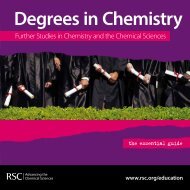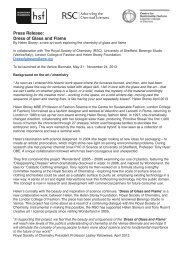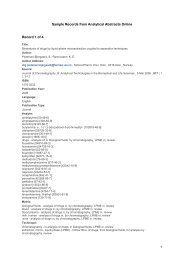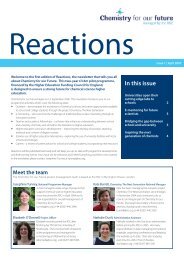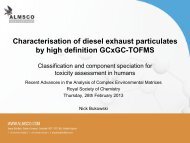FC and BC Cover art-pp16 - 1.indd - Royal Society of Chemistry
FC and BC Cover art-pp16 - 1.indd - Royal Society of Chemistry
FC and BC Cover art-pp16 - 1.indd - Royal Society of Chemistry
Create successful ePaper yourself
Turn your PDF publications into a flip-book with our unique Google optimized e-Paper software.
NEWS<br />
Get seen on the<br />
web <strong>and</strong> win £500<br />
STUDENTS HAVE THE chance <strong>of</strong> winning<br />
up to £500 by entering the RSC’s webbased<br />
competition, Exemplarchem. If you<br />
are an undergraduate or a postgraduate<br />
in the chemical sciences you can enter<br />
the 2004 competition by submitting a<br />
presentation covering any topic in chemistry,<br />
biochemistry, materials or related subjects.<br />
Authors <strong>of</strong> the best projects will be<br />
awarded prizes <strong>of</strong> £250 <strong>and</strong> the overall<br />
winner £500, plus £1,000 for his or her<br />
university dep<strong>art</strong>ment.<br />
The 2004 prize-winners’ event will take<br />
place on 29 October at the English Heritage<br />
(formerly Scientific Societies) Lecture<br />
Theatre, New Burlington Place, London.<br />
■i<br />
Last year’s winner,<br />
postgraduate<br />
student <strong>and</strong> RSC<br />
member Tony Dixon<br />
from the University<br />
<strong>of</strong> Leeds, collected<br />
£500 for his capillary<br />
electrophoresis<br />
website<br />
The closing date for entries is 30<br />
September. Go to www.chemsoc.<br />
org/exemplarchem or contact Sean<br />
McWhinnie, email mcwhinnies@rsc.org,<br />
tel 020 7440 3309<br />
New Organic<br />
Division president<br />
RAY JONES HAS taken over from Richard<br />
Taylor as president <strong>of</strong> the Organic Division.<br />
Jones will preside over the division until<br />
Ray Jones (on the right) with Richard Taylor<br />
2006. He said that after a period <strong>of</strong> change<br />
<strong>and</strong> updating <strong>of</strong> the division’s operation,<br />
the former president “has left me a strong<br />
division”.<br />
Letters<br />
Argument for a selective system<br />
I am concerned that there is no hope <strong>of</strong> the<br />
present university system being able to<br />
produce a sufficiency <strong>of</strong> the real scientists<br />
needed to prevent “the loss <strong>of</strong> world-class SET<br />
expertise”, to which Dr McWhinnie referred<br />
(RSC News June, page 5). The solution is a<br />
return to the state school system that existed<br />
until theorists <strong>and</strong> idealists sought to force<br />
all but the privately educated through an<br />
unselective education system.<br />
The government-desired shape <strong>of</strong> the<br />
school system will never obtain <strong>and</strong> retain<br />
appropriately qualified <strong>and</strong> enthusiastic<br />
graduate physics, chemistry <strong>and</strong> mathematics<br />
teachers “to provide excellent teaching in<br />
schools” if they are condemned to labour in an<br />
unselective comprehensive structure.<br />
Before the second world war, a south Wales<br />
city could provide a route by which those who,<br />
like myself, could not call on their families<br />
to finance them through the system could<br />
nevertheless be assessed as fit to proceed.<br />
From there it was possible – by a selective<br />
examination system – to proceed to at least<br />
a local university with free studentships <strong>and</strong><br />
sometimes with supplementary “exhibition” or<br />
similar financing to a first degree (without the<br />
appalling drop-out rate that appears to occur<br />
today even in the “Mickey Mouse” subjects).<br />
As I underst<strong>and</strong> the position, the undoubted<br />
problem <strong>of</strong> the later-developing child was, in<br />
early post-war years, remedied by the ability<br />
<strong>of</strong> such to enter a grammar school on the<br />
basis <strong>of</strong> subsequent performance. If only<br />
comprehensive schools exist, this <strong>of</strong> course<br />
cannot be provided.<br />
It seems inescapable that uniform teaching<br />
remuneration across the whole school system<br />
will not be effective in making this possible<br />
or successful. Moreover, such appointments<br />
must be made competitive with opportunities<br />
open to such people in other fields. Clearly, the<br />
likely unpopularity <strong>of</strong> such a situation must be<br />
made acceptable <strong>and</strong> its funding be given the<br />
necessary priority over some <strong>of</strong> the other claims<br />
on the public purse.<br />
GV Coles CChem FRSC<br />
Victoria, Australia<br />
Who should fund CPD?<br />
The usual reaction to discussions on the state<br />
<strong>of</strong> education is that more money should be<br />
given to the teachers. So it was no surprise to<br />
To comment on anything in RSC News, send a<br />
FEEDBACK letter or email to the editor (details on page 16)<br />
read the lead headline in the RSC News August<br />
(“Give funds to teachers, labs <strong>and</strong> universities”).<br />
However, another document dropped on my<br />
desk recently: the Audit Commission’s report<br />
on Education Funding (July 2004), which<br />
highlighted that nobody quite knew what<br />
funding was going into education <strong>and</strong>, once it<br />
got there, what was being done with it.<br />
The RSC News <strong>art</strong>icle stimulated some<br />
thoughts on continuing pr<strong>of</strong>essional<br />
development. In the old days, when societies<br />
were nobbut institutes, continuing pr<strong>of</strong>essional<br />
development used to be “p<strong>art</strong> <strong>of</strong> the game”.<br />
It was what you did when you had nothing<br />
more pr<strong>of</strong>essionally productive to do. That was,<br />
mark you, in the days before television <strong>and</strong><br />
barbeques.<br />
Much <strong>of</strong> what today would be labelled<br />
“CPD” took place then in the evening <strong>and</strong><br />
at weekends. Those p<strong>art</strong>icipating (the great<br />
majority <strong>of</strong> those in the pr<strong>of</strong>ession) took pride<br />
in their personal development, <strong>and</strong> paid for the<br />
training from their salaries. Salaries, for those<br />
not old enough to remember, are what used<br />
to be paid to pr<strong>of</strong>essionals in return for a 24-<br />
hours-a-day, seven-days-a-week commitment.<br />
I was a bit surprised to read, therefore, that<br />
science teachers’ CPD, done right, would cost<br />
an extra £70 million a year. Whose £70 million<br />
is that exactly?<br />
You have highlighted that without increased<br />
investment in education the UK is in danger <strong>of</strong><br />
losing its general manufacturing business to the<br />
Far East. The problem with that statement is<br />
that the tense is wrong; general manufacturing<br />
in the UK has already been lost to the Far East.<br />
The response <strong>of</strong> our tertiary education<br />
sector has been to follow the market, <strong>and</strong> help<br />
accelerate the trend. I don’t know whether that<br />
is a right or wrong policy; I just know that it<br />
gives me an uncomfortable feeling, <strong>and</strong> one<br />
that other people pouring my money into an<br />
unfocussed educational system does little to<br />
assuage.<br />
PW Munn CChem MRSC<br />
By email<br />
No deaths<br />
It’s comforting to note there have been no<br />
deaths recorded in the August issue <strong>of</strong> RSC<br />
News.<br />
Long may it continue!<br />
MR Kuhnel CChem MRSC<br />
By email<br />
6 R S C N E W S | S E P T E M B E R 2 0 0 4<br />
W W W . R S C . O R G


